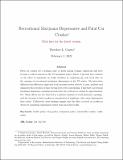| dc.contributor.author | Caputi, Theodore | |
| dc.date.accessioned | 2022-02-03T02:17:44Z | |
| dc.date.available | 2022-02-03T02:17:44Z | |
| dc.date.issued | 2022-02-03 | |
| dc.identifier.uri | https://hdl.handle.net/1721.1/139841 | |
| dc.description.abstract | Fatal car crashes are a leading cause of death among younger Americans and have become a central concern in the US marijuana policy debate. I provide new evidence on the effect of marijuana on traffic fatalities by exploiting zip code level data on the opening of recreational marijuana dispensaries in five US states. My intra-state differences-in-differences approach both increases power relative to past analyses and eliminates the potential of time-varying state-level confounding. I find that recreational marijuana dispensary openings increased the rate of fatal car crashes by approximately 6%. These effects are not observed in a placebo analysis of retail pharmacy openings, and the increase in fatal crashes is concentrated at nighttime, after most dispensaries have closed. Collectively, these findings suggest that the effect on fatal car crashes is driven by marijuana impairment rather than increased traffic. | en_US |
| dc.description.sponsorship | None | en_US |
| dc.subject | health policy, drug policy, marijuana policy, automobile crashes, traffic safety | en_US |
| dc.title | Recreational Marijuana Dispensaries and Fatal Car Crashes | en_US |
| dc.type | Article | en_US |
